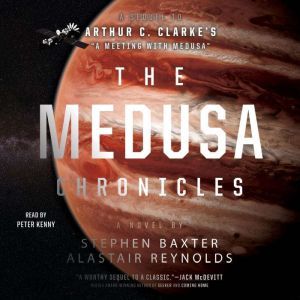Quotes
"A worthy sequel to a classic."
Two of the most acclaimed contemporary hard SF writers successfully team up in this ambitious epic space opera, spanning almost 800 years, that expands the themes raised by Arthur C. Clarke’s classic 1971 novella, A Meeting with Medusa. Clarke’s hero, Howard Falcon, suffered horrific injuries in an accident in 2080, surviving only by cybernetic surgery; his new abilities led him to a successful search for extraterrestrial life and positioned him to be an “ambassador... between the creatures of carbon and the creatures of metal.” That unsought status tests Falcon as, over the centuries, robots begin to become self-aware and seek autonomy. Humankind’s expansion of its reach beyond Earth provides more opportunity for conflict, and the authors do a superior job of predicting plausible political developments. The novel’s reach does come at the expense of some psychological depth, but fans of the authors’ other work won’t be disappointed.
"Clearly reverential but never derivative of Clarke’s original work, Baxter and Reynolds’ respective styles work in near-faultless harmony. A joy to read, it’s yet another feather in Baxter and Reynolds’ well-adorned hats."
"The Medusa Chronicles is a good old-fashioned SF tale, strong on big ideas and filled with sensa-wunda and magical moments. There’s even some genuine surprises. It’s an ambitious if not audacious thing to try, and I’ll happily admit that I am a tough critic of anything connected to one of my favourite authors, who inspired me to read science fiction. My main worry before reading was that it would have been a pastiche of one of my heroes, but instead I found a book produced with respect for one of the genre’s most-loved classic authors. I therefore think it fitting if I say that I think that Sir Arthur would be pleased by this."
"A surprisingly substantial extension of "A Meeting With Medusa" suggested by chance “by Alastair Reynolds in the course of a nostalgic email exchange” with Stephen Baxter, The Medusa Chronicles tells the story of those very centuries, and it is—if you’ll pardon my hyperbole—frickin’ terrific."
"The results are remarkable; Baxter and Reynolds may have been working out of reverence for the original story, but this is no mere exercise in nostalgia. It is a breathtaking standalone work, a sci-fi story of rare scope and intelligence, celebrating Clarke’s legacy even as it sets out for new territory."
"The authors exhibit all the speculative brilliance for which they are individually known. With this book, Baxter and Reynolds honor Clarke’s legacy at the same time as they point the way forward for the continuation of Clarke’s brand of optimistic SF which is no mere wish-fulfillment “competence porn” but also a clear-sighted depiction of both the virtues and vices of our species."
"A fitting tribute to the original."




